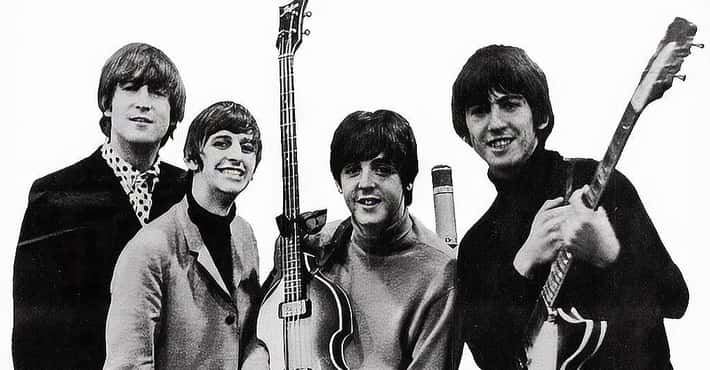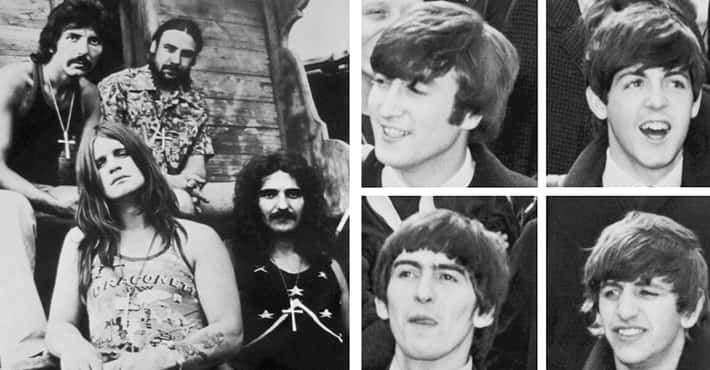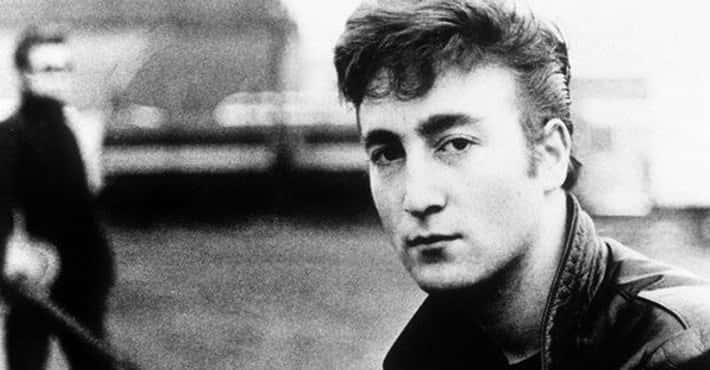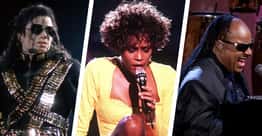
14 Beatles Covers That Just Might Be Better Than The Originals
The Beatles may have only lasted for 7 years, 7 months and 24 days as a band, but that relatively short span was enough to make them the bestselling musical artist in history (yes, to this day) - and that kind of reach doesn't just make for unfathomable influence, it makes for a whole lot of imitation, inspiration and reinterpretation. The proof is in the music; every single one of the Fab Four's 184 officially released songs has been covered.
Beatles covers span from the straightforward re-takes of Fiona Apple's “Across the Universe” to the radical reinterpretations of Aretha Franklin's “Eleanor Rigby” and Joe Cocker's “With a Little Help from My Friends,” and they dip into just about all the spectrums in between. It's no surprise that the Beatles are de-facto the single most covered band in music history, but give these Beatles covers a good, close listen, and you might just surprise yourself at how you rank them.
- Video: YouTube
 114 VOTES
114 VOTES'With a Little Help from My Friends' - Joe Cocker
Release Year: 1968
The Song That Was Covered: Like the Ringo-led vocals, “With a Little Help from My Friends” is British as heck, in all the best ways. It's downright jolly, but in a working-class sort of way. Written by Paul with help from John, it was tailored for Ringo to perform, with a little help from his friends. Maybe that's why it feels so authentic.
Why It Works: Hitting just a year after the original, Joe Cocker's retake is the poster child for cover versions that might just eclipse their source material. If Ringo's version is a jaunty walk through the cloudy English countryside, Cocker's is a straight-up thunderstorm. It hardly resembles the Beatles' composition, taking the tempo way down, rearranging chords entirely, and cranking the blues and soul meters to eleven.
Unlike the original, it was an immediate chart-topper in the ‘60s. Decades later, Cocker's “A Little Help” was resurrected for a new generation as the theme song for late-’80s TV series, The Wonder Years, and it still endures today.
- Video: YouTube
 220 VOTES
220 VOTES'Yesterday' - Marvin Gaye
Release Year: 1970
The Song That Was Covered: This song from the 1965 soundtrack to the film Help! gestures at more reflective songwriting, compared to the (history-making) bubblegum of Beatlemania. People were ready for it - of roughly 3,000 known covers of “Yesterday,” Paul McCartney calls this one the best.
Why It Works: Like so many of the most effective Beatles covers, Marvin Gaye's exploration of the track works so well because it's just so easy to believe he's lived its lyrics. The down-tempo, ultra-clean production injects the track with an overwhelming sense of real reflectiveness that goes down smooth all the way. The Beatles' original hints at melancholy, but the Prince of Motown's version leans all the way into that aspect.
Gaye's cover debuted on his 1970 album That's The Way Love Is. For more soulful Beatles covers like that, check out the excellent cover compilation Motown Meets The Beatles.
- Video: YouTube
 323 VOTES
323 VOTES'Within You Without You' - Patti Smith
Release Year: 2007
The Song That Was Covered: No song encapsulates The Beatle's late-sixties flirtation with Indian spirituality and mysticism more than “Within You Without You.” In fact, it's more about India than it is about the Beatles - George Harrison penned this one as an ode to his sitar teacher and spiritual guide, Ravi Shankar, and recorded it with traditional Indian instruments played by the Asian Music Circle (and none of the Beatles).
Why It Works: At the risk of sounding sacrilegious, the instrumentation of the original track comes off as a bit hokey and weirdly exoticizing in the 21st century. It kind of hammers home the sort of woo-woo psychedelia that The Monkees and others would later riff on to the point of parody.
On the flip side, Proto-punk queen Patti Smith's latter-day rendition strips all of that pretense away, making for a much more seasoned, authentic interpretation. And that's a theme you'll find in a lot of the very best Beatles covers: authenticity. Coming out of a musician (and human) with such a storied life experience genuinely grounds “Within You," taking the metaphysical lyrics back to earth in a way that really rings true.
- Video: YouTube
 424 VOTES
424 VOTES'Come Together' - Gary Clark, Jr.
Release Year: 2017
The Song That Was Covered: This Lennon-McCartney banger opens Abbey Road with perhaps McCartney's most thumping bassline. The song's almost aggressive message of unity stems from its origins as a protest against the Vietnam War during John and Yoko's infamous “Bed-ins for Peace,” and its original intention: a campaign song for LSD godfather Timothy Leary's gubernatorial campaign, which was never to be.
Why It Works: Austin blues rocker Gary Clark Jr. has always embraced over-the-top sonics, and the fuzz and bombast of his “Come Together” does just that. Clark's experimentation with hip hop sounds finds the perfect vessel in this track's collaborator, action soundtrack electronica royalty Junkie XL. This take on the protest classic does lack the political and cultural teeth of the original, but it leans hard into maxing out that backing track with Hendrix-worthy distortion and DJ-baiting bass.
- Video: YouTube
 531 VOTES
531 VOTES'In My Life' - Johnny Cash
Release Year: 2002
The Song That Was Covered: John Lennon once called “In My Life” his “first real major piece of work,” and in context, that makes total sense. Released on 1965's Rubber Soul, the track speaks to the experience of love in a legitimately mature fashion, but those lyrics are still packaged in a jangly, poppy wrapper befitting of four lads still rocking bowl cuts.
Why It Works: Any list of the best Beatles covers is incomplete without it. Cash's retake is, in a word, transformative.
“In My Life” was definitely not Johnny Cash's “first real major piece of work.” While Lennon was 25 at the time of release, Cash was 70; he had lived, he had loved, he had lost, and you hear it in his voice. That was sort of the theme of the Rick Rubin-produced American series of Cash cover records that this appears on. There's no pop jangle here - just a man with a 100 lifetime's worth of experience, his acoustic guitar, and some gut-wrenchingly affecting takes on beautifully written songs.
- Video: YouTube
 69 VOTES
69 VOTES'Sgt. Pepper's Lonely Hearts Club Band' - Jimi Hendrix
Release Year: 1967
The Song That Was Covered: Heady, high-concept, cacophonous and good enough for an end-of-album reprise, the title track to one of the Beatles' most essential albums personifies the colorful experimentation of the era. While “Sgt. Pepper's” was famously never performed live by the Beatles themselves, plenty of the band's contemporaries came ready to fill that gap.
Why It Works: To have experienced Hendrix's very first cover of “Sgt. Pepper's,” you had to be there. Literally. Jimi performed it just three days after the track's debut at Saville Theatre, with one George Harrison and Sir Paul McCartney in attendance.
It took until 2002 for an official release, via the (very) posthumous live album Blue Wild Angel, but if anyone's blasting that track in a 10-mile radius, you'd be hard pressed to miss it. Because of “Pepper's” lack of live play, it's kind of refreshing to hear it without all of the additional studio production - namely the crowd noise and layers of kooky sound effects - which lends Hendrix's take a condensed power. Like all his live performances, it hits like a pure fuzz-rock fist.
- Video: YouTube
 733 VOTES
733 VOTES'Something' - Billie Eilish
Release Year: 2020
The Song That Was Covered: With “Something," famously introverted Beatles lead guitarist George Harrison fully ascended to singer-songwriter status. Paring with the Harrison-led “Here Comes the Sun” on 1969’s Abbey Road, “Something” is an unpretentiously written declaration of love to Harrison's then-wife, but it doesn't skimp on sincerity, or on a ripping guitar solo.
Why It Works: Eilish dropped her cover of “Something” in a 2020 SiriusXM session, debuting a back-to-basics piano-led croon. Bereft of the original's fuzzy guitars, Billie's simplified version lends the song an authentic, personal feeling. It has a sense of closeness and intimacy that makes you believe she really could be singing about a lover.
And as a Gen Z icon's ode to some of the biggest Boomer icons out there, “Something” bridges the generation gap with just as much authenticity. As Eilish tells Far Out, “I remember listening to this song when I was in love.” One listen to her Beatles cover, and you'll have no problem believing that.
- Video: YouTube
 846 VOTES
846 VOTES'Blackbird' - Beyoncé
Release Year: 2024
The Song That Was Covered: A cut from 1968's legendary self-titled record (usually referred to as “The White Album”), McCartney's pared-down acoustic track blends a few inspirations according to Paul himself, including the Little Rock Nine incident of 1957 and the overarching Civil Rights movement that was ongoing at the time. That last aspect is ultimately what would empower the song to endure with modern listeners.
Why It Works: McCartney himself has consistently emphasized “Blackbird” as a symbol of the American Civil Rights movement, a credo for the struggle of Black people in the Southern US at the time, going so far as to say that the title should be interpreted as “Black girl.” Naturally, its themes become exponentially more powerful and affecting when performed by a Black woman - or in the case of this Beyoncé cover, one of the world's most prominent and influential Black women.
Just as in the original, context matters for the Beyoncé cover. While the Black struggle for equality has changed since 1968, it hasn't gone away. In a post-Black Lives Matters world, Beyoncé's track hits hard. “Blackbiird” debuted on Cowboy Carter, itself a concept album that gestures at Black artists reclaiming a space in the country music scene. The double “i” refers to Cowboy Carter as the second of three concept albums, but like the cover's movie-opening-esque final drop, it makes this version feel like the start of something new rather than a reflection on things past.
- Video: YouTube
 916 VOTES
916 VOTES'All My Loving' - Amy Winehouse
Release Year: 2004
The Song That Was Covered: An early radio sweetheart from 1963, “All My Loving” is basically the platonic ideal of a Beatles love ditty. Upbeat and joyful, Paul McCartney claims it was a rare case of putting the lyrics first - “It was the first song [where] I'd ever written the words first. I never wrote words first.”
Why It Works: Amy Winehouse debuted her “All My Loving” Beatles cover on the BBC in 2004, and it very much puts the lyrics front and center. This cover is smart enough to know that all it needs is Amy's once-in-a-generation voice, with just a touch of soul-style acoustic guitar backing it up. It almost comes off as a deconstruction of the original, and that's a smart move.
Covering the Beatles' earlier tracks definitely isn't as popular a choice as dipping into their later catalog, but Winehouse taps into the heart of the piece with her usual jazz-lounge ease. In her riff on the song, it's easy to see Paul McCartney first singing those lyrics to himself in the mirror, with Lennon's rhythm guitar as yet unheard.
- Video: YouTube
 1016 VOTES
1016 VOTES'Eleanor Rigby' - Aretha Franklin
Release Year: 1969
The Song That Was Covered: Almost operatic and, especially at the time, startingly frank about its themes of depression and loneliness, “Eleanor Rigby” wasn't just a turning point into the the Beatles' experimental era, it was a maturation of their style - and it might just be a maturation of pop itself. It's been covered more times than you can possibly count.
Why It Works: There's a trend you'll notice among many a Beatles cover (and maybe even pop music covers in general). More often than not, when another artist tackles an existing song, time and perspective enable them to approach it with a new kind of emotional depth, often leading to covers that are more raw, more down-tempo or more melancholic than the radio-friendly originals.
Not so with Aretha's “Eleanor Rigby." That one's 100 percent soul, and 1,000 percent Aretha. From its self-assured vocals to its driving, groovy danceability, you might not even know this was a cover if you weren't paying close attention to the lyrics. Nothing about the music here expresses the isolation of the original - it's wholly singular to the Queen of Soul, through and through.
- Video: YouTube
 1110 VOTES
1110 VOTES'Across the Universe' - Fiona Apple
Release Year: 1998
The Song That Was Covered: The Beatles didn't so much play “Across the Universe” as they let it unfold. The electronically slowed track feels like it's just pouring out of John from another place in another space - almost like endless rain into a paper cup.
Why It Works: While Apple's easygoing track doesn't reinvent the original in any significant ways, it does the important work that covers do: it contemporizes the original song for an all new audience. Released nearly 30 years after the Beatles' original as part of the soundtrack for 1998 throwback movie, Pleasantville, “Across the Universe” helped keep classic rock alive for ‘90s kids. What's more, it re-popularized the track for nearly as many years of further reinterpretation, all the way up to a certain movie musical whose title has all but laid claim to the song. Apple’s airy alt-rock vibes and charmingly textured vocals don't hurt a bit, either.
Plus, you could pretty easily argue that Fiona's “Across the Universe” has handily outlived Pleasantville itself.
- Video: YouTube
 124 VOTES
124 VOTES'We Can Work It Out' - Stevie Wonder
Release Year: 1970
The Song That Was Covered: Still early in the Beatles' ascension at 1965, “We Can Work It Out” keeps things crisp and jaunty, but introduces a slightly acerbic edge that hints at the headiness to come. It's a genuine McCartney-Lennon collab - something that would become increasingly rare as time went on - with a waltz-y touch dreamed up by George Harrison.
Why It Works: Gone are any Germanic influences from Stevie Wonder's raucous re-do. It rips from the jump.
Rather than deviating entirely or dissecting the original, Wonder's “We Can Work It Out” almost feels like a lateral interpretation. Same vibes, same feeling, totally different style. It's percussive, it's rock n' roll, it's soul. It's got all that Wonder rasp and sweetness, and all of Stevie's signature optimism, too.
- Video: YouTube
 134 VOTES
134 VOTES'Hey Jude' - Wilson Pickett
Release Year: 1969
The Song That Was Covered: The McCartney-led “Hey Jude” debuted as a single with “Revolution,” but even as a latter-day release, the ballad expressed a sense of camaraderie that resonated with audiences. Written to comfort Lennon's son Julian during his parents' divorce, McCartney's vocals blend rawness and consolation. As a ballad from a father's friend - virtually an uncle - to a young boy, “Hey Jude” finds its joy as a different kind of love song.
Why It Works: Covered almost contemporaneously with the single's 1968 release, R&B star Wilson Pickett's version may not have the personal emotional connection of McCartney's original, but it doesn't lack a lick of soul. Pickett's version goes down smooth, approaching the song with more technically polished vocals and a more easygoing vibe that isn't afraid to fully unleash itself when the time comes. Its also cuts some of the “nah nah nah”-flavored fat that made the original track clock in at over 7 minutes long, coming in a full 3 minutes shorter.
And it had popular sticking power, too - Pickett welcomed the Bee Gees to join him in a twice-as-soulful duet of the cover on The Midnight Special in 1973.
- Video: YouTube
 1410 VOTES
1410 VOTES'Here Comes The Sun' - Nina Simone
Release Year: 1971
The Song That Was Covered: Legend goes that George Harrison penned “Here Comes the Sun” out in the English countryside on a day when he bailed on a meeting, and you know what? It totally feels like that. Because this track is all that simple, joyous, lazy release of saying “heck it all, I'm touching grass,” but personified as a song.
Why It Works: Nina Simone gives “Here Comes the Sun” the lightest of African folk touches, arrangement-wise, but what really makes this one special is her voice. The smokiness, the texture, the fullness of Simone's vocals take Harrison's lazy day to a whole new level. And that harp that hits midway through? Inspired.
It's no wonder Simone chose this track as the title for her 1971 cover collection (but don't sleep on her versions of “O-o-h Child” or “Mr. Bojangles,” either).























